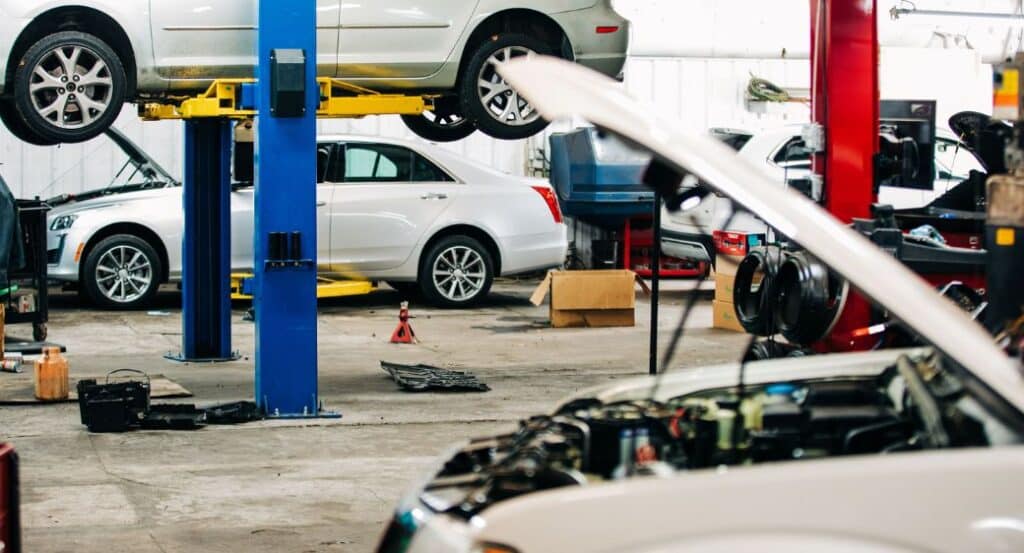12 Common Engine Problems Identified Through Diagnostics

Sharing this:
When was the last time you checked your car's engine? Many drivers overlook this crucial aspect of vehicle maintenance, leading them to inadvertently cause serious problems. This blog post will explore 12 common engine problems identified through diagnostics. By the end, you'll understand why regular diagnostics can save you time and money.
Misfiring Cylinders
A misfiring cylinder is one of the most frequent engine problems. It occurs when the air-fuel mixture in the cylinder fails to ignite correctly. This issue can lead to decreased engine power and increased emissions. Diagnostics can pinpoint the misfiring cylinder and determine the underlying cause.
Several factors can cause cylinders to misfire, including faulty spark plugs, ignition coils, or fuel injectors. Identifying the specific cause is essential for resolving the issue promptly. Regular maintenance and timely diagnostics can prevent misfiring, ensuring your engine runs smoothly.
Failing to address misfiring cylinders can lead to more significant engine damage. This damage can be costly to repair, making early detection and resolution vital.
Engine Overheating
Engine overheating typically results from issues with the cooling system, such as a faulty thermostat, water pump, or radiator. Regular engine diagnostics can help identify overheating issues before they lead to catastrophic failure. Diagnostics can detect leaks, blockages, or malfunctioning components by monitoring the cooling system. Timely repairs can prevent overheating and extend your engine's lifespan.
Ignoring engine overheating can lead to warped cylinder heads, a blown head gasket, or a cracked engine block. These problems are costly and challenging to repair, emphasizing the importance of early detection through diagnostics.
Fuel System Issues
The fuel system is crucial for delivering the right amount of fuel to the engine. Problems within this system can lead to reduced performance, increased emissions, and even engine failure. Diagnostics play a pivotal role in identifying fuel system issues early on.
Common fuel system problems include clogged fuel injectors, a failing fuel pump, and a dirty fuel filter. Diagnosing these issues in their early stages can prevent further damage and improve your vehicle's fuel efficiency. Proper maintenance and regular diagnostics keep your fuel system functioning optimally.
Ignoring fuel system problems can lead to engine stalling, poor acceleration, and reduced fuel economy. These issues affect your driving experience and can lead to costly repairs.

Faulty Oxygen Sensors
Oxygen sensors are vital components of your vehicle's emission control system. They monitor the exhaust gases and ensure the engine uses the correct air-fuel mixture. Faulty oxygen sensors can lead to increased emissions and decreased fuel efficiency.
Diagnostics enable you to identify malfunctioning oxygen sensors before they affect your vehicle's performance. Replacing faulty sensors promptly ensures your engine runs smoothly and meets emission standards. This proactive approach helps avoid potential fines or penalties related to excessive emissions.
Ignition Coil Problems
Ignition coils convert voltage from the battery into the spark needed to ignite the air-fuel mixture in the cylinders. Faulty ignition coils can lead to misfires, poor performance, and increased emissions. Diagnostics can help identify ignition coil problems early.
One of the most common signs of ignition coil failure is engine misfiring. Detecting and replacing faulty ignition coils promptly can prevent further engine damage.
Exhaust System Failure
The exhaust system is crucial in reducing harmful emissions and maintaining engine performance. Problems within the exhaust system can lead to increased noise, reduced power, and higher emissions. Diagnostics are essential for identifying exhaust system issues early on.
Common exhaust system problems include leaks, clogged catalytic converters, or damaged mufflers. Detecting these issues early can prevent further damage and ensure compliance with emission standards.
Ignoring exhaust system problems can lead to decreased fuel efficiency, increased emissions, and costly repairs. Diagnostics help keep your exhaust system in top condition, ensuring your engine runs efficiently and meets emission standards.
Timing Belt or Chain Issues
The timing belt or chain controls the opening and closing of the engine's valves. Problems with the timing belt or chain can lead to engine misfires, decreased performance, and potential engine damage. Ignoring timing belt or chain problems can lead to catastrophic engine failure and costly repairs.
Vacuum Leaks
Vacuum leaks can cause many engine problems, including rough idling, poor acceleration, and increased emissions. Diagnostics can help identify vacuum leaks early and prevent further damage. Addressing vacuum leaks promptly ensures your engine runs smoothly and efficiently.
Damaged hoses, gaskets, or intake manifold components are common causes of vacuum leaks. Regular diagnostics help detect these issues before they lead to more severe problems. Addressing vacuum leaks early can maintain your engine's performance and fuel efficiency.
Ignoring vacuum leaks can lead to decreased fuel economy, poor performance, and costly repairs. Diagnostics are crucial in identifying and fixing vacuum leaks, ensuring your engine runs optimally.
EGR System Malfunctions
The exhaust gas recirculation (EGR) system reduces nitrogen oxide emissions by recirculating some exhaust gases into the engine. Common EGR system problems include clogged passages, faulty valves, or malfunctioning sensors. Detecting these issues early can prevent further damage and ensure compliance with emission standards. Regular diagnostics maintain your EGR system's performance and prolong its lifespan.
Ignoring EGR system malfunctions can lead to increased emissions, decreased fuel efficiency, and costly repairs. Regular diagnostics help keep your EGR system in top condition, ensuring your engine runs efficiently and meets emission standards.

Engine Knock
Engine knock, or pinging, occurs when the air-fuel mixture detonates prematurely in the cylinders. This issue can lead to decreased performance and potential engine damage. Detecting these issues early can prevent further damage and improve your engine's performance.
Ignoring engine knock can lead to decreased fuel efficiency, increased emissions, and costly repairs. Diagnostics are crucial in identifying and fixing the causes of engine knock, ensuring your engine runs optimally.
Oil Leaks
Oil leaks can lead to decreased engine performance, increased wear, and potential engine damage. Diagnostics help identify the source of oil leaks early and prevent further damage.
Damaged gaskets, seals, or oil pan components are common causes of oil leaks. Regular diagnostics help detect these issues before they lead to more severe problems. By addressing oil leaks early, you can maintain your engine's performance and prolong its lifespan.
Clogged Air Filters
A clogged air filter can restrict airflow to the engine, leading to decreased performance, increased emissions, and reduced fuel efficiency. Diagnostics help identify clogged air filters early and prevent further damage.
Dirt, debris, and contaminants are common causes of clogged air filters. Detecting these issues early can prevent further damage and improve your engine's performance. Ignoring clogged air filters can lead to decreased fuel economy, poor performance, and costly repairs.
Conclusion
Identifying and addressing engine problems promptly can ensure your vehicle continues to run as expected. Luckily, these 12 common engine problems are easily identified through diagnostics.
Our facility offers comprehensive engine repair services to address any issues you may encounter. Our team of experienced technicians is ready to help you maintain your engine and keep your vehicle in top condition. Contact us today to schedule a diagnostic test and ensure your engine runs at its best.



